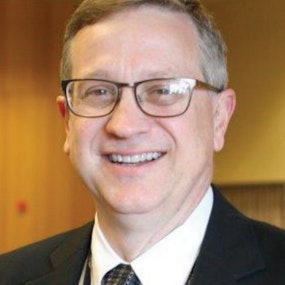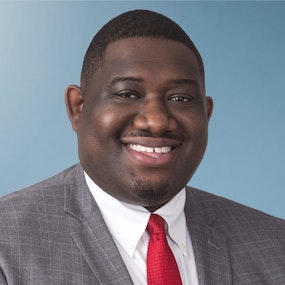ROBERT JOHNSON:
This is the award-winning Public Health Review Morning Edition for Friday, March 15, 2024. I'm Robert Johnson. Now, today's news from the Association of State and Territorial Health Officials.
SCOTT HARRIS:
It was a great way just to establish some new relationships with some new staffers and to continue developing our relationships with our congressional leaders.
JOHNSON:
Alabama State Health Officer and ASTHO member Dr. Scott Harris recalling his recent visit to Congress a few weeks ago, seeking support for public health priorities and raising awareness of the impact high food prices are having on the WIC program.
HARRIS:
We met with several members of our Alabama congressional delegation, many of their staffers, and we talked to them about the talking points that we had to discuss related to WIC and the impending fiscal hole because of increasing food costs.
JOHNSON:
Harris says the meetings also were an opportunity to ask congressional offices to support sustainable public health funding.
HARRIS:
You know, the pandemic really showed that we kind of had to start from scratch in some places and just sort of build everything from the ground up on-the-fly in the middle of the response. And, and clearly, that's not, not an ideal way to do it.
JOHNSON:
ASTHO will release a new blog article about Hill Day next week. We'll have more about that on Monday.
Hill Day may be over, but ASTHO continues to talk with elected leaders. This time about the President's proposed budget released earlier this week. Jeffrey Ekoma is here to tell us more in our View from Washington, D.C. report.
Jeffrey Ekoma, good to have you here on the newscast this morning. How are you today?
JEFFREY EKOMA:
I'm doing well. It's a pleasure to be back.
JOHNSON:
We're glad to have you here talking about the President's budget today. It's now on the street. You've spent a lot of time along with others at ASTHO going over it. What can you tell us about it?
EKOMA:
Yeah, we were really pleased to see the President's budget, it came out a little later than typically expected, but we're really happy for what's in it. There were a lot of ASTHO member policies that were reflected in the budget. A lot of those policies and programs receive level funding, or even slight increases. For example, there was $250 million, or level funding, for CDC's Public Health Infrastructure and Capacity Grant program, or PHIG. The budget also included a legislative proposal that would allow CDC to dedicate a small percentage of funding to support a new team of response-ready staff for short- and long-term details of deployments. There was also $224.6 [million] or a close to $50 million increase for CDC's Public Health Data Modernization Initiative, about $8 million or level funding for CDC's Social Determinants of Health program, $735 million or level funding for their Public Health Emergency Preparedness cooperative agreement, again, $60 million, or again, level funding for Preventative Health and Health Services Block Grant. And last, but certainly not least, $240 million or level funding for the Hospital Preparedness Program.
JOHNSON:
Now that the budget is out on the street, tell us what's next in the process.
EKOMA:
Yeah, so- so the budget is now before Congress, and I should also note that Congress does have the ability to either accept, or reject, or modify the President's budget. So, what we expect to happen for the next couple of weeks is, um, many cabinet officials of the President will be going up to Congress to talk about the budget, to talk about what's in there, to talk about the proposals that are included in the President's budget. And what's also interesting about this time is our team at ASTHO will also be meeting with congressional members and their staff to talk about the many different programs and policies that our members care about. And to talk about how important those programs are and why we're advocating for additional resources for those programs. So, lots of work still ahead of us.
JOHNSON:
Speaking of a lot of work, there is another deadline on the calendar, March 22, a potential partial government shutdown. What do we know about that? Where does it stand?
EKOMA:
Yeah, I mean, it's something that we've been talking about for the last couple of weeks. And Carolyn [Mullen] mentioned this last week, you know, with the past year, the first six of 12 appropriation bills. Now the last six, they have an expiring date of next week: Friday, March 22. We've been reading media reports. I mean, things seem really optimistic. At this point, I think we're also remaining very optimistic that legislative language regarding those six bills will be introduced, at least by this weekend, to give for enough time for the bills to pass through both the House and the Senate. So, just like everyone else, we're closely awaiting the release of that text and hope to provide details about that next week.
JOHNSON:
And the hope is this could maybe be the last deadline for a while.
EKOMA:
That's the hope, we're all keeping our fingers crossed.
JOHNSON:
Fingers crossed for a good weekend, also. Jeffrey Ekoma, thank you for coming on the show today. We'll look forward to an update on all of this very soon.
EKOMA:
Absolutely, talk soon.
JOHNSON:
You can read ASTHO's assessment of the new budget by clicking the link in the show notes.
Also today, March is Women's History Month. North Carolina Public Health Director and ASTHO member Dr. Susan Kansagra remembers a wall of photos where she did her residency.
SUSAN KANSAGRA:
You know, my residency institution, they had a hallway where they had pictures of every class along the way for many, many years stretching back and it was really amazing to look at those photos because you can see when certain things started to change, and when women first started entering residency classes, to the point where I was, where actually, women were the majority of the residency class.
JOHNSON:
Kansagra says she'll never forget the impact of those hallway images.
KANSAGRA:
I always remember taking my time walking past that wall because it was always very inspiring.
JOHNSON:
Finally, this morning, ASTHO produces a series of email newsletters to help us stay connected to legislation, policy, and the latest resources and events. You can sign up for all of them using the link in the show notes.
Before we go, a reminder also to follow this newscast on your podcast player and connect with ASTHO on social media. We're on LinkedIn, Twitter, and Facebook.
That'll do it for today. We're back Monday morning with more ASTHO news and information. I'm Robert Johnson. You're listening to the award-winning Public Health Review Morning Edition. Have a great weekend.







